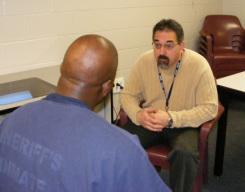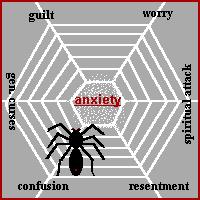Organizing the Addiction Counseling Process Index
I wrote a series of articles appeared in five consecutive issues of RESCUE, the journal of the Association of Gospel Rescue Missions. The focus was to give counselors some guidance that would help them more effectively work with homeless addicts.
Here are the five articles:
Organizing the Addiction Counseling Process Index Read More »




 who at one time would have been hospitalized for their problems. As many as half of them are also addicted to alcohol and/or drugs. Many are “self-medicating” — using addictive substances to cope with their mental problems. Social service professionals usually do not like working with these “dually diagnosed” people because they can be so demanding and time-consuming. They can be too destructive and troubled for the typical addiction recovery program. And, mental health workers shy away from them because they often do not stay sober long enough for treatments to be effective. So, they end up at the rescue mission.
who at one time would have been hospitalized for their problems. As many as half of them are also addicted to alcohol and/or drugs. Many are “self-medicating” — using addictive substances to cope with their mental problems. Social service professionals usually do not like working with these “dually diagnosed” people because they can be so demanding and time-consuming. They can be too destructive and troubled for the typical addiction recovery program. And, mental health workers shy away from them because they often do not stay sober long enough for treatments to be effective. So, they end up at the rescue mission.


 A Christian friend once told me, “Well, why even talk about feelings, because you can’t trust them anyway. The Bible says, Have faith and don’t trust your feelings.” Well, that’s not really a healthy attitude at all, because feelings are real. Denial is all of these repressed and stuffed emotions, and part of sobriety and getting better means that all of a sudden all of the pain that has been pushed down. And anger, and everything else that has been there, is going to start rising to the surface, and these people will start feeling depression and loneliness and fear. And we need to be prepared to hear those things and to respond to them in a supportive, kind way. It doesn’t mean that — and some of those feelings are not accurate at all, but still need to be respected and accepted. It has to be there.
A Christian friend once told me, “Well, why even talk about feelings, because you can’t trust them anyway. The Bible says, Have faith and don’t trust your feelings.” Well, that’s not really a healthy attitude at all, because feelings are real. Denial is all of these repressed and stuffed emotions, and part of sobriety and getting better means that all of a sudden all of the pain that has been pushed down. And anger, and everything else that has been there, is going to start rising to the surface, and these people will start feeling depression and loneliness and fear. And we need to be prepared to hear those things and to respond to them in a supportive, kind way. It doesn’t mean that — and some of those feelings are not accurate at all, but still need to be respected and accepted. It has to be there. to survive in a home devoid of healthy parental love, limits, and consistency, they must develop “survival skills” very early in life. In a chaotic, dysfunctional family, the lack of external control through consistent loving disciple results in an inability to develop internal discipline and self control. They learn not to depend on their parents to meet their needs – instead, it is all up to themselves. And, because they can’t trust their own parents, they become generally suspicious and mistrustful of all human beings. Yet, they are defenseless against the projection of blame and often feel responsible for parents’ addiction. They become “little adults” that feel compelled to accept responsibilities well beyond their years.
to survive in a home devoid of healthy parental love, limits, and consistency, they must develop “survival skills” very early in life. In a chaotic, dysfunctional family, the lack of external control through consistent loving disciple results in an inability to develop internal discipline and self control. They learn not to depend on their parents to meet their needs – instead, it is all up to themselves. And, because they can’t trust their own parents, they become generally suspicious and mistrustful of all human beings. Yet, they are defenseless against the projection of blame and often feel responsible for parents’ addiction. They become “little adults” that feel compelled to accept responsibilities well beyond their years.